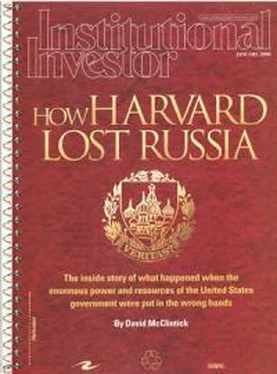As the U.S. government's litigation proceeded with deliberate speed, Shleifer was distinguishing himself in the world of economics. He was earning a growing reputation as a theorist in the emerging field of behavioral finance even as he published a series of books and articles analyzing the changes in Russia. (In 1994 the industrious Shleifer had formed with fellow academics -- and behavioral finance specialists -- Josef Lakonishok and Robert Vishny a Chicago-based money management firm known as LSV Asset Management. Today it manages about $50 billion in quantitative value equity portfolios, though, according to the firm's Web site, Shleifer no longer has an ownership stake.)
In 1999, Shleifer cemented his place in the firmament of American economists when he won the John Bates Clark Medal, a ticket to the most-exalted circles of global academic economists. Paul Samuelson, who won it in 1947, and Milton Friedman, who won in 1951, subsequently received Nobel prizes. Summers was awarded the medal in 1993.
Shleifer remained close to his friend and mentor Summers; they talked to and saw each other frequently and continued vacationing together in the summer on the Cape. Then it became known in early 2001 that Summers was on the short list of candidates to succeed Neil Rudenstine as the president of Harvard University. Shleifer and Zimmerman began campaigning for Summers to get the Harvard post, giving meet-and-greet parties for him at their home. Summers stayed with them when he visited Harvard.
In March 2001, Summers was named president of Harvard. Shleifer, who had been courted by New York University's Stern School of Business, decided to stay put.
Having his close friend as his boss would turn out to be quite helpful to Shleifer. Summers asserted in his deposition that he recused himself from any involvement in the university's handling of the Shleifer matter, but the new president stayed involved anyway. Early in his presidency he told the dean of the faculty of arts and sciences, Jeremy Knowles, to keep Shleifer at Harvard.
"I expressed to Dean Knowles," Summers testified in a deposition in 2002, ". . . that I was concerned to make sure that Professor Shleifer remained at Harvard because I felt that he made a great contribution to the economics department . . . and expressed the hope that Dean Knowles would be attentive to that. . . . I think he recognized and shared the concern."
Summers hinted in the deposition that although he didn't know all the facts and wasn't a lawyer, he felt his friend Shleifer might have been unfairly accused -- that there was nothing necessarily wrong with "providing advice on a financial issue in which one had an interest."
Summers said conflict-of-interest "issues," in his Washington experience, were "left to the lawyers." He said he was sensitive to "ethics rules," but testified that "in Washington I wasn't ever smart enough to predict them . . . things that seemed very ethical to me were thought of as problematic and things that seemed quite problematic to me were thought of as perfectly fine. . . ."
Knowles, at least in principle, took a different view. He testified to the federal grand jury investigating Shleifer that he expected faculty to know the regulations prohibiting conflicts and to "understand the spirit, not just try to squeeze past the letter. . . ."
Harvard has disciplinary procedures for dealing with errant professors. The Committee on Professional Conduct, composed of a rotating group of senior faculty, provides guidance on conflict-of-interest questions to professors who seek it in advance of making an investment. It isn't unusual to solicit such counsel. Had Shleifer and his wife approached Knowles before making their investments, Knowles told the grand jury, he probably would have referred them to the committee. They had not come to him.
The committee also gathers facts on alleged misconduct and reports its findings to the dean, who then must decide whether to discipline or sanction the alleged offender. Penalties range from light to severe. Dismissing or forcing the resignation of a tenured professor at Harvard is very rare, but it can be done under the so-called Statutes of Harvard University, the school's venerable governing tenets, originating in 1650, 14 years after Harvard's founding. The Third Statute provides for dismissal for ". . . grave misconduct or neglect of duty . . ." The procedure, which is called "invoking the Third Statute," is so rare that few at Harvard have even heard of it.
When the Shleifer scandal broke, Knowles did not mobilize the committee. As allegations against Shleifer hadn't yet been litigated, Knowles took the position -- and so testified to the grand jury -- that Shleifer was innocent until proven guilty.
Knowles tells Institutional Investor that he does not remember Summers' approaching him about Shleifer. "I don't recall this particular conversation, but the president and I shared the goal of recruiting and retaining the best faculty, so it would have been perfectly natural for us to mention to each other the names of people that we certainly wouldn't want to lose." However, not long after Summers says he intervened on the professor's behalf, Knowles promoted Shleifer from professor of economics to a named chair, the Whipple V.N. Jones professorship.
Knowles left the deanship in 2002 and is currently the Amory Houghton professor of chemistry and biochemistry and a distinguished service professor at Harvard. His successor as dean of the faculty of arts and sciences was William Kirby, a former chairman of the history department and a noted China scholar, who was appointed dean by Summers effective July 1, 2002.
Shleifer's legal position changed on June 28, 2004, when Judge Woodlock ruled that he and Hay had conspired to defraud the U.S. government and had violated conflict-of-interest regulations. Still, there was no indication that the Summers administration had initiated disciplinary proceedings. To the contrary, efforts were seemingly made to divert attention from the growing scandal. The message from the top at Harvard was, "No problem -- Andrei Shleifer is a star," says one senior Harvard figure.
The Summers-Shleifer friendship flourished. They spoke on the phone more than once a day, on average. Two months after the court ruling against Shleifer, he hosted Summers at a break-the-fast dinner on Yom Kippur.
David Cutler, another Summers protégé and professor of economics, whom the Harvard president had elevated to dean of social sciences, hosted a "Social Sciences Colloquium" lecture series in 2004 and designated Shleifer as one of the first speakers. Shleifer spoke on Russia, about which he had penned an article for the March/April 2004 issue of Foreign Affairs ; the article, "A Normal Country," grew into a book of that name published in 2005. Later in the year Cutler invited Shleifer to a gathering of prominent Harvard scholars to discuss what the university should be doing to advance research and scholarly work in Russia.
The continuing efforts on Shleifer's behalf, particularly after the court adjudged him liable for conspiracy to defraud the government, offended a number of professors, some of whom quietly approached the chairman of the Committee on Professional Conduct, professor Jeffrey Frieden of the government department. In departments of the university that depend heavily on grants from the U.S. government, conflict-of-interest rules are ubiquitous and strictly observed; some of the professors warned that the university's credibility with federal agencies could be compromised if no action were taken against Shleifer.
Committee chairman Frieden told those who inquired that the committee's function was limited to fact-finding and that as the federal court had already established the facts in the Shleifer case, the matter was more appropriately before Dean Kirby than before the committee. More than one professor felt that Frieden seemed intimidated by Summers.
Читать дальше






![Джонатан Димблби - Barbarossa - How Hitler Lost the War [calibre]](/books/385421/dzhonatan-dimblbi-barbarossa-how-hitler-lost-the-w-thumb.webp)





